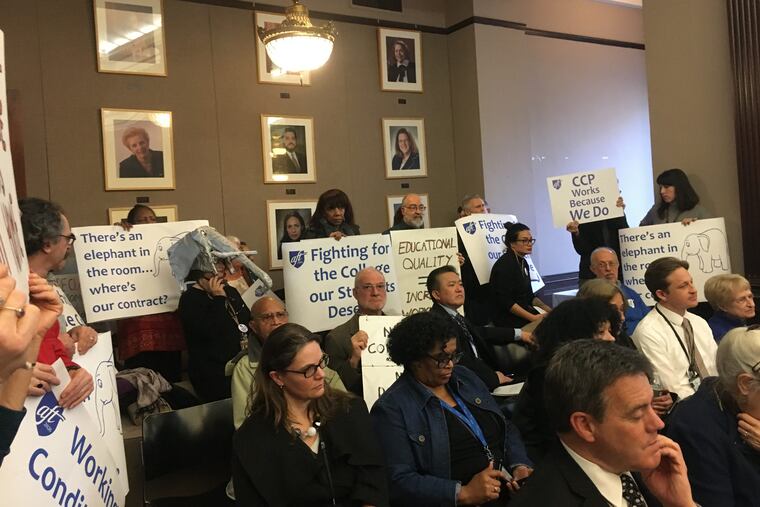Were CCP professors on strike? Union says no. But a labor ruling indicates otherwise.
Community College of Philadelphia faculty are required to participate in assessments designed to determine whether courses are meeting their objectives in helping students learn. If they refuse, it's considered a strike activity, Pa. labor board ruled.

Contract negotiations between faculty and the administration at the Community College of Philadelphia have dragged on for the last three years with no end in sight.
But both sides recently got clarity on one thing: Faculty are required to participate in assessments designed to determine whether courses are helping students learn. If they refuse, it’s considered a strike activity, according to a ruling handed down by a hearing examiner for the Pennsylvania Labor Relations Board.
The ruling was a win for the administration, which has argued that faculty must participate in the assessments and that failure to do so constituted a partial strike.
“The teachers’ obtaining and providing of assessment data is as much at the core of the college’s existence as their standing in front of a classroom and providing course materials,” the ruling said.
The hearing examiner, however, faulted the college for threatening to discipline and in five cases actually disciplining faculty who refused to provide the assessment data, noting that the school failed to follow protocol when a strike action occurs. Specifically, the college should have contested the strike action in Common Pleas Court before imposing any discipline, the ruling said.
College president Donald “Guy” Generals was pleased the ruling upheld the college’s right to require the assessments.
“It’s critical to our mission to be able to evaluate courses and programs,” Generals said. “We’ve said that all along and the examiner verified that for us.”
The college, he said, is “weighing its options,” maintaining that the union appears to have been on strike for the last couple of years by urging its members not to perform the duties. He declined to say what those options are.
“We have a legal team that is looking at those things,” he said.
Steve Jones, chief negotiator for the 1,300-member union, which includes full-time faculty, part-time faculty, and support staff, said the union would abide by the ruling and already had directed members to perform the work. But he disputed the assertion that the union was on strike.
“That’s really stretching things," Jones said. “The reason they are so focused on this ... [is that] they are trying to piece together an argument that the conditions were met for them to impose a contract on us.”
If the college imposes a contract, Jones asserted, “all hell is going to break loose.”
The union in 2017 advised faculty that performing the assessment work was optional and that they should refrain from voluntary assignments until a new contract is in place. The move came amid tense contract negotiations that have intensified since the previous pact expired 2½ years ago. Last May, the college issued its “final” offer to the union, which it rejected,
The hearing examiner noted in the ruling that faculty have participated in assessments for many years, and even though the college hadn’t disciplined those who refrained from it prior to 2016, that doesn’t mean it wasn’t a required duty. The ruling affirmed the college’s position that withholding the service could jeopardize the college’s accreditation, critical to its existence.
“The college has the statutory right and the contractual authority to mandate that individual faculty members collect and provide assessment data when they are teaching courses selected for assessment,” the ruling said.
A mediator is continuing to try to help the two sides come together. Meanwhile, faculty at a meeting on Wednesday were scheduled to discuss the history of strikes at the college and the impact they’ve had, Jones said.